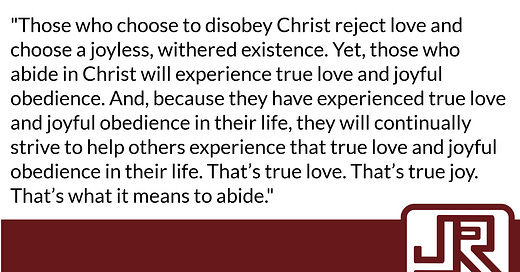
Joyful, Life-Filled Obedience
“I am the vine; you are the branches. Whoever abides in me and I in him, he it is that bears much fruit, for apart from me you can do nothing. If anyone does not abide in me he is thrown away like a branch and withers; and the branches are gathered, thrown into the fire, and burned. If you abide in me, and my words abide in you, ask whatever you wish, and it will be done for you. By this my Father is glorified, that you bear much fruit and so prove to be my disciples. As the Father has loved me, so have I loved you. Abide in my love. If you keep my commandments, you will abide in my love, just as I have kept my Father’s commandments and abide in his love. These things I have spoken to you, that my joy may be in you, and that your joy may be full.” (John 15:5–11, ESV)
Rethinking Abiding
The word “abide” is a very “Christian” word. People outside of Christian circles—unshaped by God’s Word—never say “abide.” But Christian love the word. I hear it all the time.
The word “abide” can mean “to remain,” “to stay,” “to continue,” or “to live.” Because Jesus also uses “abide” to describe a branch’s relationship with a vine, people have also understood “abide” as describing “connection.” This is why so many Christians love the word. They love the imagery of being “connected to Christ.” There’s a sense of intimacy.
So I typically get the same mental image whenever I hear a Christian use the word “abide.” It’s the image of a child curled up in the lap of their father in front of a warm fireplace. This is how we view abiding—intimately resting in the lap of our Father in heaven. It’s comforting, peaceful, warm. Yet, when we listen to Jesus use “abide” in his sermon, we get a different feeling—a different image.
Abiding Obedience
Jesus says, “Whoever abides in me and I in him, he it is that bears much fruit” (John 15:5, ESV). So, abiding isn’t really about “resting in the lap of our father,” but more about bearing fruit—living changed lives in Christ. It’s about obedience. This is why Jesus also says, “If you keep my commandments, you will abide in my love, just as I have kept my Father’s commandments and abide in his love.” (John 15:10, ESV). Abiding and Obedience are connected. If you obey, you will abide. If you abide, you will obey. If you’re not obeying, you’re not abiding.
Abiding In Love
Also, notice another connection Jesus makes. He says, “If you keep my commandments, you will abide in my love, just as I have kept my Father’s commandments and abide in his love.” (John 15:10, ESV). There’s a three-way connection between abiding, obedience, and love. Abiding in Jesus’ love means being obedient. If you’re not obeying, you’re not abiding, AND you’re not loving. In order to love, you must abide AND you must obey.
Love and Obedience
It’s important that we understand this and get it deep into our bones—especially in today’s cultural moment. Many Christians are working hard to separate love and obedience. I regularly hear Christians say, “We can’t tell someone to stop doing sinful things, that wouldn’t be loving.” Yet, that is a complete distortion of Jesus’ teaching. Obedience to Jesus IS an act of love. It’s not loving to disobey Jesus. It’s not loving to allow someone to disobey Jesus.
Don’t forget what Jesus says happens to those who disobey, don’t love, and don’t abide: “If anyone does not abide in me he is thrown away like a branch and withers; and the branches are gathered, thrown into the fire, and burned.” (John 15:6, ESV). They wither. They no longer have true life. They dry up and are thrown into the fire. It’s not loving to quietly watch that happen, saying nothing.
Here’s what is truly loving: Calling people to repentance and faith so that they can obey Christ and abide in his love. When that happens, they will NOT wither, but will truly experience life and will bear fruit. They will also experience TRUE JOY. That’s why Jesus ends by saying, “These things I have spoken to you, that my joy may be in you, and that your joy may be full.” (John 15:11, ESV).
Joyful Obedience
Those who choose to disobey Christ reject love and choose a joyless, withered existence. Yet, those who abide in Christ will experience true love and joyful obedience. And, because they have experienced true love and joyful obedience in their life, they will continually strive to help others experience that true love and joyful obedience in their life. That’s true love. That’s true joy. That’s what it means to abide.









